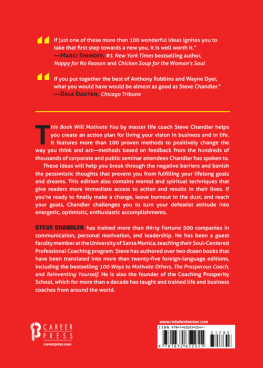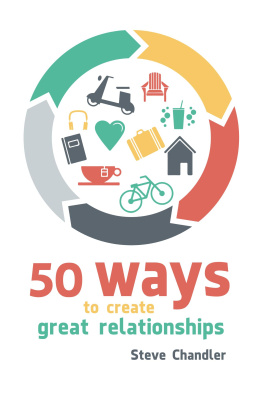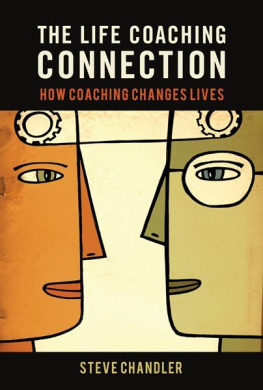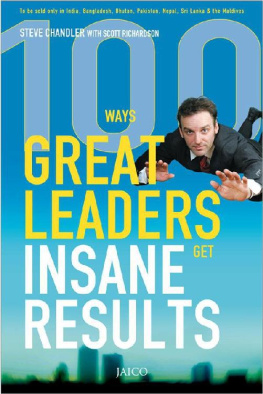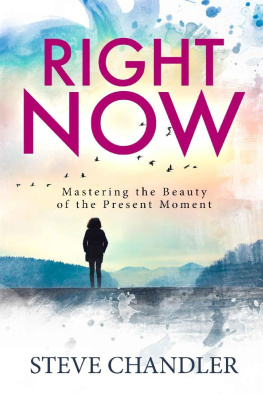




or Kate
Blank Page
Acknowledgments
Kathryn Eimers for the consulting and humor Steve Hardison for the deep water Fred Knipe for the creative ideas Jessica, Stephanie, Margery, and Bobby for the gifts Jeanne and Ed Eimers for the blue car Devers Branden for the counsel Ron Fry for the publishing Maurice Bassett for the resources Colin Wilson for the philosophy Ken Wilber for making everyone right Nathaniel Branden for the psychology Terry Hill for the letters from Barcelona Stacey Farkas for the editing Lindsay Brady for the perception Dr. M.F. Ludiker for advice from hell
And to the memory of Barry Briggs, writer, teacher, friend
Blank Page
Contents
Chapter 1: 27
Chapter 2: 32
Chapter 3: 34
Chapter 4: 39
Chapter 5: 43
Chapter 6: 46
Chapter 7: 51
Chapter 8: 58
Chapter 9: 61
Chapter 10: 65
Chapter 11: 70
Chapter 12: 75
Chapter 13: 83
Chapter 14: 87
Chapter 15: 91
Chapter 16: 95
Chapter 17: 100
Chapter 18: 104
Chapter 19: 107
Chapter 20: 110
Chapter 21: 113
Chapter 22: 116
Chapter 23: 120
Chapter 24: 129
Chapter 25: 134
Chapter 26: 137
Chapter 27: 141
Chapter 28: 147
Chapter 29: 151
Chapter 30: 155
Chapter 31: 157
Chapter 32: 160
Chapter 33: 163
Chapter 34: 171
Chapter 35: 174
Chapter 36: 180
Chapter 37: 182
Chapter 38: 186
Chapter 39: 189
Chapter 40: 193
Chapter 41: 196
Chapter 42: 200
Chapter 43: 204
Chapter 44: 206
Chapter 45: 209
Chapter 46: 212
Blank Page
JNo one cart make you change. J7o one can stop you from changing. No one really knows how you must change. 'Not even you. Not until you start.
-David Viscott
Risking
Blank Page
Preface
A Cocoon Will
Not Fly
Most of us live in a cocoon of personality-the madeup story of who we are.
It seems dark and dusty inside this little cocoon, and we think we can't get out. We tell ourselves stories about our personality, but these stories aren't reality. Deep down, we know we're more than this personality.
We could tear open the cocoon if we wanted to. We could push out and see the light of the world. We could learn to fly.
But most of us will live trapped inside our personalities for our entire lives, never knowing that we can leave. We are victims of our own invented limits. We wake up each morning to a world that is dim and unclear. There are so many problems wrapped around us; there is almost no light. Pushing against the inner wall of the cocoon seems futile. Why bother? I am the way I am.
So why are there people who learn to push through? How exactly do they learn to create themselves all over again? It is reported that these people feel like they're learning to fly.
In effect, they are reinventing who they are. And, in the process, they become owners of the human spirit. They are victims no more.
Blank Page
W,611 are you unhappy? Because 9 9. 9 percent of what you think, v4nd everything you do, is for your self, And there isn't one.
-Wei Wu Wei
Blank Page
,761trvdUCtfO l
Are You an Owner or
a Victim?
As you look back on your life so far, you will see that you always have had two basic ways of being. At any given time, you were either one way, or you were the other; you were either an owner of the human spirit, or you were a victim of circumstances.
One way, the ownership way, reinvents you as you go. It reinvents you outward, in an ever-expanding circle of compassion, vision, and courage. The other way (the victim way) shrinks you down. Just as your muscles shrink when they are not moving, so do your heart and soul when you are in your victim mode.
One way to get a visual picture of an owner of the human spirit is to watch an early film of Elvis Presley singing "Heartbreak Hotel," when he was in his 20s and fully alive. You see joy, power, and lighthearted possession of the spirit.
Owners give all of themselves to what they're doing. They pour all their energy into the current moment.
Dave Marsh, in his insightful musical biography Elvis (1997), writes about the moment Elvis Presley burst upon the American scene. In his first appearance on the Dorsey Brothers' Stage Show on TV, the young singer rocked the world. Marsh described Elvis' startling rendition of "Heartbreak Hotel" and concluded, "He owned the song and he owned the crowd."
When we give ourselves fully to something, we own it. In a sense, we spin, spiral, and wrap our spirit around it completely.
Ownership is a form of creative responsibility, just as Harry S. Truman took ownership of the presidency the minute he said, "The buck stops here!"
In the movie Ransom, the character played by Mel Gibson makes a dramatic and surprising shift from victim to owner. After his son is kidnapped by sadistic criminals, he is talked into going along with their demands. He agrees to be passive and play the good victim for the whole first half of the movie. But then, he snaps, and refuses to go along. In the movie's defining moment, he becomes an owner:


